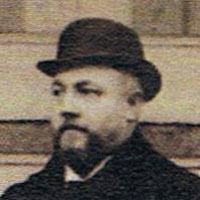Joshua Parlby

Born: Longton, Staffordshire 1855, died: ?
1st August 1893 - 31st May 1895
Joshua Parlby was a larger than life figure with a strong belief in promoting the activities he believed in. He came to Manchester to take over a public house and immediately, like Furniss before him, looked to get involved with the local community. Whereas Furniss had taken an interest in the church and the interests that kept the congregation interested, Parlby was more interested in the social activities of east Mancunians. His role within the brewing community of Manchester led to his involvement with Ardwick AFC – in 1887 Ardwick's headquarters were the Hyde Road Hotel, the Club was nicknamed the Brewerymen, and by 1893 Chester's Brewery played a major part in every aspect of the Club's life.
According to some historians Parlby was a player and committee member with Stoke prior to arriving in Manchester, so it's possible he had some knowledge of tactics when he became Ardwick manager. This does make sense as he was born in Staffordshire, however the 1881 census claims he was a bookkeeper by profession, so how and exactly when he moved to Manchester has not yet been fully identified. It is known he was still living in Staffordshire in 1882 when he married a local girl. Whatever his background it's clear that he was always one of the more vocal members of the Club. So vocal in fact that it is believed he was the man who suggested the Club needed a paid secretary, someone who could focus on the team, instead of someone doing it in their spare time. His fellow committee members then proceeded to give him the new professional role and he was paid fifty shillings a week.
Ardwick were renowned for their financial struggles during their first couple of seasons in the League and Parlby became well known for his ability to 'wrangle' the Club out of various financial problems. Stories of fare-dodging on the railways when travelling to away games were well known to supporters during the 1890s. It's hard to imagine any of the Club's modern day managers having to sneak his side on and off trains as the railway guards attempt to check tickets.
Parlby always wanted the Club to achieve much more than this and it is clear that as his first season in charge progressed he was already planning a move to relaunch the Club. He felt Ardwick AFC was very much a parochial name and not one that could appeal on the national stage. He had also seen how near neighbours Newton Heath had fared in Division One (they were accepted into an enlarged division in 1892). The Heathens were to be relegated at the end of 1893-94 but more importantly they had failed to attract sufficient support. Parlby felt that a Manchester-named side could achieve so much more.
The final season of Ardwick saw Parlby's side finish 13th out of 15 clubs, but by this time he had already sought League approval for the admittance of his new invention "Manchester City" to replace Ardwick in the Second Division. It's not clear which of City's main committee men came up with the new name, but it is known that Parlby was the one promoting the new Club. As a new arrival in the city himself, it's possible the lure of the sprawling city excited him and he may wel have had more pride in Manchester and what the city stood for than many of those who had lived in the city for decades.
Parlby remained as secretary-manager and the 1894-95 season saw the Blues finish 9th out of 16 clubs in Division Two. He stood down as secretary-manager in the close season. Some have suggested this was to concentrate on a new public house he had taken over in Bolton, although it seems most likely that he felt he had achieved his main aim of re-establishing the Club in a manner that would increase popularity. Whatever the truth, Parlby remained an influential committee man until 1905. Some would say too influential as the reign of his successor Sam Ormerod was noted for the constant involvement of Parlby and others. Clearly Parlby felt the Club had been his creation and he wanted others to share his vision and love of the Club.
Parlby was a board member until the over-zealous F.A. forced him out of Hyde Road, while almost killing the club, in 1905, although he wasn't named as one of the directors banned and fined. At the age of 54 in 1909 he rejoined the board and stayed an active member for three years before he moved away from the area.
All history and statistical material has been produced based on the research and writing of Manchester football historian Gary James (www.facebook.com/GaryJames4). It is maintained by Ric Turner & Gary James. All text remains the copyright of the original contributors.
Gary's book, Manchester - the City Years: Tracing the Story of Manchester City from the 1860s to the Modern Day, is available to order on Amazon.